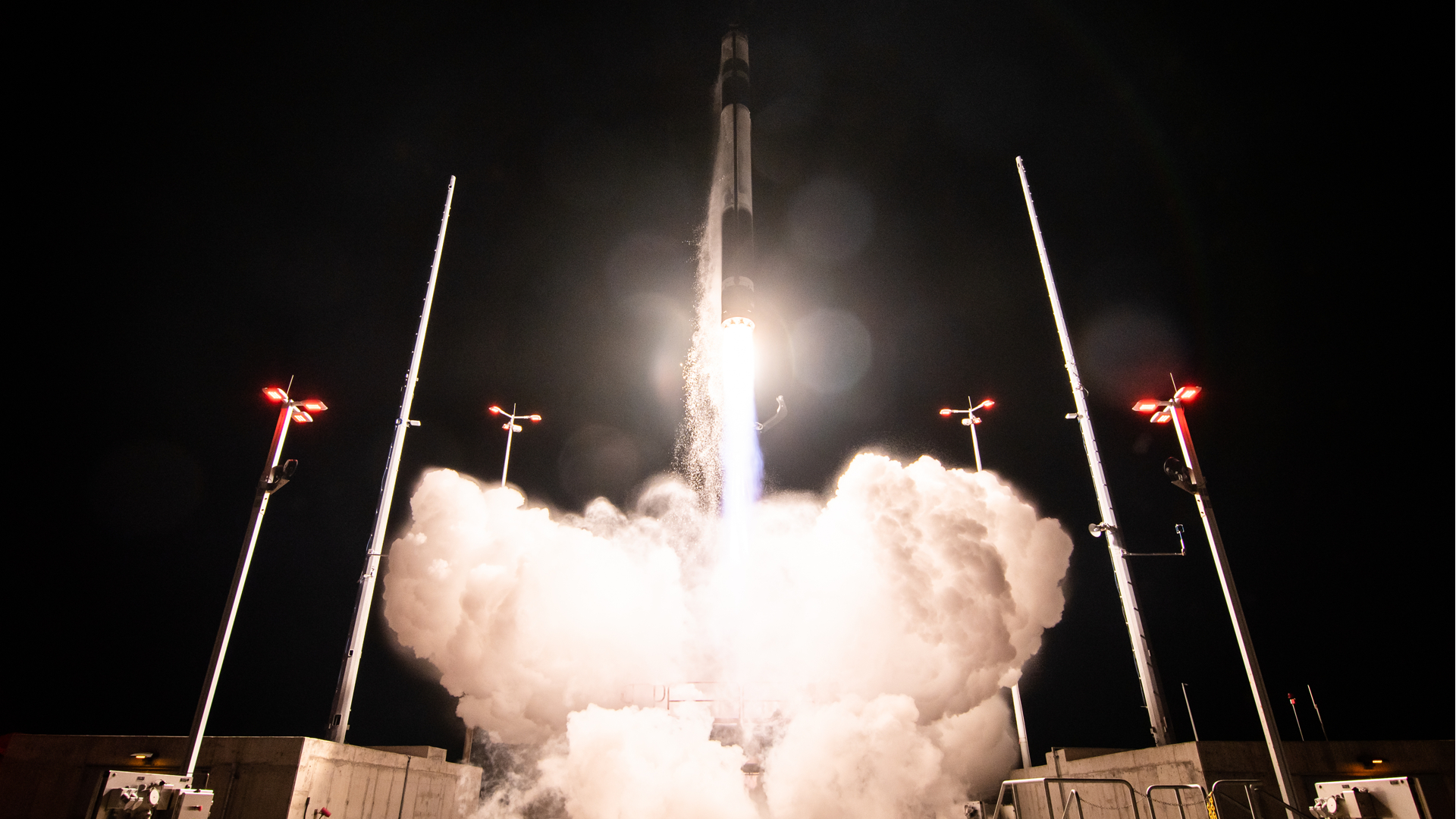Rocket Lab launches 1st Electron booster from US soil in twilight liftoff
Rocket Lab now has a new launch site for what may be monthly missions from Virginia.
WALLOPS ISLAND, Va. — The small satellite launch company Rocket Lab aced its debut liftoff from American soil on Tuesday (Jan. 24), paving the way for potential monthly flights from the U.S. East Coast.
A Rocket Lab Electron booster launched from NASA's Wallops Flight Facility here with three commercial radio frequency satellites for customer HawkEye 360 on board.
Liftoff occurred at 6 p.m. EST (2300 GMT), about 45 minutes after sunset. The rocket lit up the twilight sky over Virginia's Eastern Shore with a rumbling roar, soaring over the stars of the Orion constellation as it arced into orbit.
"Liftoff of Electron from Launch Complex 2, leaving U.S. soil for the first time and on its way to space, up and over the Atlantic Ocean!" Murielle Baker, Rocket Lab's communications manager, said during a webcast of Tuesday's launch.
The three satellites were deployed as planned at an altitude of about 340 miles (550 kilometers) just under an hour after liftoff. News of this success was delayed by about 35 minutes, however, because a communications-receiving ground station wasn't functioning properly.
Related: Facts about the smallsat-launching company Rocket Lab

Tuesday's launch, called "Virginia Is for Launch Lovers" (a play on the state's tourism motto "Virginia Is for Lovers"), was years in the making for Rocket Lab, which until now has launched Electron missions only from its two pads on the Mahia Peninsula of New Zealand's North Island.
Get the Space.com Newsletter
Breaking space news, the latest updates on rocket launches, skywatching events and more!
The Virginia launch site is part of the Mid-Atlantic Regional Spaceport for commercial launches out of Wallops. Rocket Lab finished building its pad at the U.S. site in 2020.
"We're incredibly excited about the capability we're bringing to Virginia by delivering responsive launch for our customers from U.S. soil, and we're also proud of the opportunities it creates for the local community by creating highly skilled jobs and bringing high-tech manufacturing to the Eastern Shore," Rocket Lab founder and CEO Peter Beck said in a statement before launch. The new pad will offer additional flexibility for U.S. commercial, military and government flights, he added.
Rocket Lab hoped to begin launches from Wallops in 2020, but delays with a NASA-developed autonomous flight termination system that was required for Electron launches from the range added years of delay. The system is automated safety software designed to help rockets self-terminate if they veer off course during flight.
NASA Wallops Flight Facility director David Pierce said the agency found numerous errors in the software that required correction and additional testing by NASA, the U.S. Space Force and the Federal Aviation Administration. Those issues were resolved in mid-December 2022, with only bad weather preventing a launch attempt on Dec. 18.
"It's been nothing short of a Herculean effort to get us to this point, which I view as a turning point in launch range operation, not just at Wallops, but across the United States," Pierce told reporters ahead of Rocket Lab's first launch attempt last month.
Rocket Lab's debut U.S. launch was the first of three planned missions for its Virginia-based customer HawkEye 360, which is building a constellation of small satellites for radio frequency surveillance. The company will fly a total of 15 HawkEye 360 satellites by 2024 under the deal, with Tuesday's launch lofting the firm's fifth batch of satellites overall.
"For our fifth cluster of next-generation satellites, we needed optimal orbital flexibility, and Rocket Lab's new Electron launch pad in Wallops, Virginia provides the perfect domestic capability," HawkEye 360 CEO John Serafini said in a different prelaunch statement. "Rocket Lab's inaugural launch facilitates our first mid-latitude satellite cluster, which will strengthen the diversity of our geospatial insights for our government and commercial customers across the globe."
Rocket Lab currently plans to launch roughly one Electron mission a month from the Wallops pad. The company is building a larger reusable rocket called Neutron that will also fly from the Virginia pad. The first flight of the Neutron rocket is expected no earlier than 2024.
Electron has always been an expendable vehicle, but Rocket Lab is working to make its first stage reusable. The company has recovered and analyzed Electron boosters on several orbital missions to date, on one occasion even plucking a falling first stage out of the sky with a helicopter. There was no recovery attempt on "Virginia Is for Launch Lovers," however.
Email Tariq Malik at tmalik@space.com or follow him @tariqjmalik. Follow us @Spacedotcom, Facebook and Instagram.
Join our Space Forums to keep talking space on the latest missions, night sky and more! And if you have a news tip, correction or comment, let us know at: community@space.com.

Tariq is the Editor-in-Chief of Space.com and joined the team in 2001, first as an intern and staff writer, and later as an editor. He covers human spaceflight, exploration and space science, as well as skywatching and entertainment. He became Space.com's Managing Editor in 2009 and Editor-in-Chief in 2019. Before joining Space.com, Tariq was a staff reporter for The Los Angeles Times covering education and city beats in La Habra, Fullerton and Huntington Beach. In October 2022, Tariq received the Harry Kolcum Award for excellence in space reporting from the National Space Club Florida Committee. He is also an Eagle Scout (yes, he has the Space Exploration merit badge) and went to Space Camp four times as a kid and a fifth time as an adult. He has journalism degrees from the University of Southern California and New York University. You can find Tariq at Space.com and as the co-host to the This Week In Space podcast with space historian Rod Pyle on the TWiT network. To see his latest project, you can follow Tariq on Twitter @tariqjmalik.









